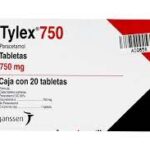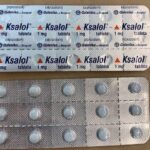Mybulen Tablets: Uses, Dosage, Side Effects, Addiction

What is Mybulen tablet?
Mybulen tablets is a medication used to relieve body pain, toothache, muscles pain, pain in teeth, cold, fever, relief of mild to moderately severe pain, menstruation pain, joints pain, flu and other conditions. Mybulen tablets may also be used for purposes not listed in this medication guide.
Mybulen tablets contains Ibuprofen 200mg, Codeine phosphate 10mg and Paracetamol 350mg as active ingredients.
Ibuprofen belongs to a group of medicines called non-steroidal anti-inflammatory drugs (NSAIDs). It works by reducing hormones that cause pain and swelling in the body.
Codeine is from a group of medicines called opiates, or narcotics. It works in the central nervous system and the brain to block pain signals to the rest of the body. It also reduces the anxiety and stress caused by pain.
Paracetamol, also known as acetaminophen, is a medication used to treat fever and mild to moderate pain. Paracetamol seems to work by blocking chemical messengers in the brain that tell us we have pain. Paracetamol also reduces fever by affecting the chemical messengers in an area of the brain that regulates body temperature.
Who can and cannot take Mybulen tablets?
Adults and children aged 12 years and over can take Mybulen tablets. Only give it to a child or young person aged 12 to 17 years old if painkillers like paracetamol or ibuprofen alone have not worked.
Mybulen tablets is not suitable for young children. Never give Mybulen tablets to children under 12 years old.
Mybulen tablets are not suitable for some people. To make sure Mybulen tablets is safe for you, tell your pharmacist or doctor if you:
• have ever had an allergic reaction to ibuprofen, other non-steroidal anti-inflammatories (NSAIDs), codeine or any other medicine
• are trying to get pregnant, already pregnant, or breastfeeding
• are 18 years old or under and have had your tonsils or adenoids taken out to treat a sleep problem called obstructive sleep apnoea
• have asthma
• have a head injury
• have adrenal gland problems
• have a condition that causes seizures or fits
• have ever had bleeding in your stomach, a stomach ulcer, or a hole (perforation) in your stomach
• have a health problem that means you have an increased chance of bleeding such as haemophilia or thrombocytopenia
• have liver problems, such as liver fibrosis, cirrhosis or liver failure
• have heart disease or severe heart failure
• have kidney failure
• have Crohn’s disease or ulcerative colitis
• regularly drink more than the maximum recommended amount of alcohol (14 units a week).

How and when to take Mybulen tablets
Follow the instructions that come with your medicine. This is particularly important because the codeine in Mybulen tablets can be addictive.
Take this medication by mouth as directed by your doctor. If you have nausea, it may help to take this drug with food. Ask your doctor or pharmacist about other ways to decrease nausea (such as lying down for 1 to 2 hours with as little head movement as possible).
The dosage is based on your medical condition and response to treatment usually 1 – 2 capsules 4 hourly and not more than 6 capsules per 24 hour. Do not increase your dose or use this drug more often or for longer than prescribed, because your risk of side effects may increase. Properly stop the medication when so directed.
Pain medications work best if they are used as the first signs of pain occur. If you wait until the pain has worsened, the medication may not work as well.
If you have ongoing pain (such as due to cancer), your doctor may direct you to also take long-acting opioid medications. Ask your doctor or pharmacist about using Mybulen tablets safely with other drugs.
Suddenly stopping Mybulen tablets may cause withdrawal, especially if you have used it for a long time or in high doses. To prevent withdrawal, your doctor may lower your dose slowly. Tell your doctor or pharmacist right away if you have any withdrawal symptoms such as restlessness, mental/mood changes (including anxiety, trouble sleeping, thoughts of suicide), watering eyes, runny nose, nausea, diarrhea, sweating, muscle aches, or sudden changes in behavior.
When this medication is used for a long time, it may not work as well. Talk with your doctor if this medication stops working well.
Though it helps many people, Mybulen tablets may sometimes cause addiction. This risk may be higher if you have a substance use disorder (such as overuse of or addiction to drugs/alcohol). Take this medication exactly as prescribed to lower the risk of addiction. Ask your doctor or pharmacist for more details.
If you have bought Mybulen tablets from a pharmacy, do not use it for more than 3 days. If you still have pain, talk to your pharmacist or doctor. It’s important to ask them for advice about ongoing pain relief.
What if I forget to take it?
Take the missed dose as soon as you remember, unless it’s almost time for your next dose. In this case, skip the missed dose and take your next one as normal. Never take a double dose to make up for a forgotten one.
What if I take too much?
Taking too much Mybulen tablets can be dangerous. Taking too much paracetamol (acetaminophen) can cause liver damage, sometimes serious enough to require liver transplantation or cause death. You might accidentally take too much Mybulen tablets if you do not follow the directions on the prescription or package label carefully, or if you take more than one product that contains the same ingredient.
It can cause side effects, such as:
• feeling very sleepy, sick or dizzy
• finding it difficult to breathe or changes in your heart rate (it can become slower or faster)
• becoming unconscious, if you take a lot
The amount of Mybulen tablets that can lead to an overdose varies from person to person. In case of overdose, call the poison control helpline at 1-800-222-1222. Information is also available online at https://www.poisonhelp.org/help. If the victim has collapsed, had a seizure, has trouble breathing, or can’t be awakened, immediately call emergency services at 911.
What are the side effects of Mybulen tablets?
Like all medicines, Mybulen tablets can cause side effects. But because you only take it for a very short time (up to 3 days), you’re unlikely to have any side effects.
Common side effects of Mybulen tablets include:
• headaches
• feeling dizzy
• feeling sleepy
• constipation
• feeling or being sick (nausea or vomiting)
• indigestion and heartburn (acid reflux)
• wind
Serious side effects
Stop taking the medicine and call a doctor straight away if you have:
• black poo or blood in your vomit – these can be signs of bleeding in your stomach
• swollen ankles, blood in your pee, or not peeing at all – these can be signs of a kidney problem
Immediate action required:
• you have severe chest or stomach pain – these can be signs of a hole in your stomach or gut
Serious allergic reaction
In rare cases, it’s possible to have a serious allergic reaction (anaphylaxis) to Mybulen tablets.
Immediate action required:
• you get a skin rash that may include itchy, red, swollen, blistered or peeling skin
• you’re wheezing
• you get tightness in the chest or throat
• you have trouble breathing or talking
• your mouth, face, lips, tongue or throat start swelling
You could be having a serious allergic reaction and may need immediate treatment in hospital.
These are not all the side effects of Mybulen tablets. For a full list, see the leaflet inside your medicines packet.
How to cope with Mybulen tablets side effects
What to do about:
• headaches – if you get headaches after taking Mybulen tablets, do not take any more and see if the headache goes away. It might be better to try another painkiller, like paracetamol. Talk to your doctor if the headaches do not go away or are severe.
• feeling sleepy – do not drive, cycle or use tools or machinery if you’re feeling drowsy. Do not drink any alcohol as this will make you feel more tired.
• feeling dizzy – if you begin to feel dizzy, lie down so you do not faint. If you feel dizzy when you stand up, try getting up very slowly or stay sitting down until you feel better. Do not drive or use tools or machinery while you feel like this.
• constipation – eat more high-fibre foods, such as fresh fruit and vegetables and cereals. Try to drink several glasses of water or another non-alcoholic liquid each day. If you can, it may also help to increase your level of exercise.
• feeling or being sick – take Mybulen tablets with or just after a meal or snack. Feelings of sickness normally wear off. Talk to your doctor if it bothers you. Take small, frequent sips of water or squash if you’re being sick to avoid dehydration. Signs of dehydration include peeing less than usual or having dark, strong-smelling pee. Do not take any other medicines to treat vomiting without speaking to a pharmacist or doctor.
• indigestion and heartburn (acid reflux) – stop taking the medicine and speak to your pharmacist or doctor if it does not go away. If you need something to ease the discomfort, try taking an antacid, but do not put off speaking to your pharmacist or doctor if the symptoms do not go away.
• wind – try not to eat foods that cause wind (like lentils, beans and onions). Eat smaller meals, eat and drink slowly, and exercise regularly if you can. There are pharmacy medicines that can also help, such as simethicone.
Can I take Mybulen tablets during pregnancy?
The Ibuprofen in Mybulen tablets can affect your baby’s circulation and amniotic fluid if you take it after 28 weeks, or for more than a few days at a time.
Codeine in Mybulen tablets also can affect your baby, especially towards the end of pregnancy. Your baby may get used to having codeine and may have withdrawal symptoms when they’re born. There is a slightly higher risk of your baby having breathing problems. These are usually temporary, but your baby may need to stay in hospital for extra monitoring.
As a result, Mybulen tablet is not recommended during pregnancy. Other medicines are more suitable. Ask your doctor or pharmacist for advice.
Can I take Mybulen tablets while breastfeeding?
Breastfeeding women Should NOT take Mybulen tablets because, small amounts of the codeine may get into breast milk and can cause breathing problems in your baby.
What medications can interact with Mybulen tablets?
Tell your doctor if you’re taking these medicines before you start taking Mybulen tablets:
• anticoagulants, such as warfarin
• other anti-inflammatory painkillers, such as aspirin (including a daily low dose of 75mg), diclofenac, mefenamic acid and naproxen
• medicines for high blood pressure
• steroids that you swallow, such as prednisolone
• antidepressants, such as citalopram, fluoxetine, fluvoxamine, paroxetine, sertraline or venlafaxine
• other antidepressants called monoamine oxidase inhibitors (MAOIs)
• methotrexate (a medicine for psoriasis and rheumatoid arthritis)
• lithium (a medicine for mental health problems)
• other medicines that can make you sleepy, such as sleeping pills or tranquillisers.
Can I Mix Mybulen tablets with herbal remedies and supplements?
There’s not enough research to know whether complementary medicines and herbal remedies are safe to take with Mybulen tablets. They are not tested in the same way as other medicines.





